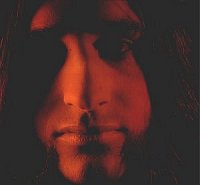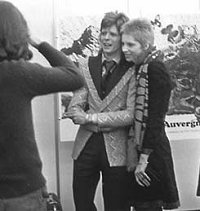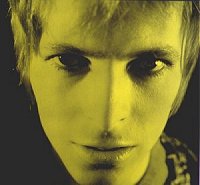Back to index
Barrett, Syd: Psychedelic leader of The Pink Floyd
in the 1960s who was one of Bowie's heroes and whose stage presence and sci-fi sounds were
to be an influence on Bowie's Ziggy Stardust character. Bowie's friendship with the
photographer Mick Rock had initially been sparked because he was a friend of Barrett's.
Bowie confided in Mick Rock at the time that his three greatest artistic and musical
influences were Iggy Pop, Lou Reed, and Barrett. Bowie, who had seen Barrett play at The
Marquee, named his pre-Ziggy band "Arnold Corns" after Barrett's "Arnold
Layne" single and later recorded an excellent version of Barrett's "See Emily
Play" on his PinUps (1973) album.
"Syd Barrett with his white white face and
his black eyeliner all around his eyes - this strange presence singing in front of a band
that was using light shows. I thought, 'Wow! He's a bohemian, a poet, and he's in a rock
band!'" - Bowie (From "A Saucerful of Secrets" by Nicholas
Schaeffner)
I used to hang out at The Marquee with Marc Bolan, even
before we decided we wanted to become famous. We became rivals for a couple of years then
we became friends again. We were incredibly inspired by Syd Barrett of Pink Floyd. There
was a kind of space mysticism around Syd that we both interpreted in different ways. I saw
Pink Floyd at The Marquee and was inspired to write musicals. So I ended up performing a
Pink Floyd like version of 'Chim Chiminee' - very odd!! -
Bowie
BBC Sampler (1996):
Beck, Jeff: Famous British guitarist
and one of Mick Ronson's guitar heroes (George Harrison was the other) who appeared
on-stage with Bowie at the final Ziggy Stardust concert at Hammersmith Odeon, London on 3
July 1973. He duetted with Bowie on the songs "The Jean Genie" and part of The
Beatle's "Love me Do" with Bowie singing and playing harmonica on the latter
and also played on the song "Round and Round". However, he is not seen on the
official video because - according to Tony Visconti - he was concerned with the appearance
of his bell-bottom flares.
Beethoven's 9th Symphony: This was adapted by Walter
Carlos (now known as Wendy Carlos, following a sex-change operation) and Rachel Enkind,
and performed by Walter Carlos for the soundtrack to the film CLOCKWORK ORANGE (1972) and
used by Bowie to open his Ziggy Stardust concerts. It can be heard playing over the PA
system on the film/video of ZIGGY STARDUST - THE MOTION PICTURE (1983) and Bowie is shown
whistling a few bars before he takes the stage. In 1990 Bowie also used it to open his
Sound + Vision concerts. If you own the soundtrack - the specific music used starts @ 2.32
into the fourth track entitled "Ninth Symphony, Second Movement - Abridged."
Bethel, Barry: Road manager for the
Ziggy Stardust Tours and stage announcer's voice at the concerts.
"Bewley Brothers, The" (Bowie):
Song on HUNKY DORY (1971) and also used by Bowie as the name for his publishing company.
Ken Scott recalls Bowie obtaining the name from a tobacconist located close to Trident
Studios. The song is believed to be about the relationship between Bowie and his nine-year
older manic-depressive/schizophrenic step-brother Terry Burns. An alternate mix version of
this song was included on the 1990 Rykodisc/EMI HUNKY DORY (1971) CD as a
bonus track.
Billy the Kid: Credited hair stylist
for The 1980 Floor Show - a small Ziigy clone who
was a friend of Freddi Burretti's.
Bingenheimer, Rodney: Club owner of Rodney's
English Disco on 7561 Sunset Strip, Hollywood, which played Bowies records non-stop in
the early seventies and was home to the notorious Star Girls groupies. Bingenheimer
is a longtime L.A. scene figure and still recalls the time in 1971 when he and David Bowie
cruised Hollywood High trying to meet girls. "The girls didn't
like David," Rodney says. "Maybe it was because he
was wearing a dress." In early 1971, Bowie explained the concept of Ziggy
Stardust to him while writing the lyrics to the title song.
Rodney "on-the-'Roq" Bingenheimer, is one of the best known disc
jockeys in the world, and has been called "The Prince of Pop." His show on Los
Angeles' KROQ-FM has been a hit with youth of all ages since it's inception in late 1976,
becoming famous for, among other things, the newest and the best rock music for all of
L.A.'s "in-crowd" and forward thinking listeners.
Rodney appeared on the Monkees' TV series as a regular guest, and was Davy
Jones' stand-in when he was a kid. As a teenager, Rodney grew up with hundreds of rock
stars, including: The Monkees, Sonny & Cher, The Beach Boys, The Beatles, The Byrds,
Elvis Presley, and David Bowie (while landing Bowie a record contract with RCA .) Rodney
Does a Bowie salute every year on that star's birthday as well as doing a Phil Spector
salute on that producer's birthday.
In the 70's Rodney made his name as a national columnist for "Go" and
"Phonograph Record" magazines; and he also operated and co-owned his club,
"Rodney Bingenheimer's English Disco", an L.A. club where Bowie, Iggy Pop,
T.Rex, Suzi Quatro, Led Zeppelin, and the Sweet where all regulars. In fact, the list of
Rodney's friends in music, TV and movies is a "Who's Who" of rock. Rodney even
recorded a single with Thurston Moore of Sonic Youth and Eric England of Hole called "I
Hate the 90's" produced by Cameron Jamie.
He was the first to play records by - and interviews with such artists on his
KROQ show as: Blondie, The Ramones, The Sex Pistols, Van Halen, The Go-Go's, Nina Hagen,
The Cramps, Nena, The Clash, The Cure, The Smiths, The B-52's, Billy Idol, Adam Ant,
Echobelly, Ride, X, Siouxie and the Banshees, Bad Religion, Duran Duran, The Jam, The
Bangles, The Runaways Redd Kross, Bananrama, Joan Jett, Tom Petty, Dramarama, Teenage Fan
Club, Suede, The Jesus and Mary Chain, Echo and the Bunnymen, No Doubt, Blur, Elastica,
Belly, L7, Sonic Youth, Nirvana, Rialto, Placebo, Oasis, The Verve, Kent, Ash, Gene,
Travis, Coldplay, Doves, JJ72, The Strokes, Starsailor, The Hives, The Vines, Black Rebel,
Motorcycle Club, and The Electric Soft Parade plus over 300 celebrity interviews!
Rodney's movie credits include Up in Smoke, Rock 'n' Roll High School,
Repo Man, Get Crazy, Back to the Beach (with Pee-Wee Herman), The
Runnin' Kind, Rockula, Inevitable Grace, and Frank Zappa's
newly-released Uncle Meat and Mondo Hollywood "TSOL Live From
O.C." (on home video), as well as videos by The Ramones ("Something to Believe
In"), Lifestyles of the Ramones and the Monkees ("Heart and Sole"). Rodney
also hosted KDOC-TV's "Request Video" program in L.A. and Orange County, and
UHF's "Notes From The Underground. Rodney also played a character in Nickelodeon's
"Sponge Bob Square Pants."
Then there were the books; Rodney has been mentioned in: I'm With the Band by
Pamela Des Barres; the Bowie biographies: Stardust, Alias David Bowie, and The Bowie
Chronology; as well as Ultra Violet's Famous for Fifteen Minutes; John Tobler's Elvis: The
Legend and the Music; The Monkees' Tale by Eric Lefkowitz; Wonderland Avenue, by Danny
Sugerman; Led Zeppelin: Hammer of the Gods, by Steven Davis; Ramones: An American Band, by
Jim Bessman; Route 666: On The Road to Nirvana, by Gina Arnold; Networking In The Music
Industry, by Eric Olsen, George Harrision's Dark Horse, by Geoffrey Giuliano; Life as
Such, by Lord Such; Hollywood Rock, by Marshall Crenshaw; and Making Tracks: The Rise and
Fall of Blondie, by Debbie Harry and Chris Stein (with whom Rodney recorded "Little
GTO".) Other Books included: Waiting for the Sun, by Barney Hoskyns; The Look, by
Paul Gorman; The L.A. Musical History Tour, by Art Fein; and The Punk Rock Diary, by
George Gimarc.
Today, as always, Rodney represents the young. He plays music you can't hear
anywhere else in America on the radio - local L.A. artists, punk, imports, and psychedelic
60's music; and he supports it with his continuous involvement in the L.A. and world-music
scenes. In short, the key to Rodney Bingenheimer's success is his Janus-like ability to
recognize the past - while always looking toward the future in music.
Alone in L.A. Rodney seemed like myself, an island of anglo 'nowness'. He even
knew British singles and bands that I wasn't aware of. There was nothing about him that
wasn't 'on'. Rodney single-handedly cut a path through the treacle of the 60's, allowing
all we 'avants' to parade our sounds of tomorrow, dressing in our clothes of
derision"
David Bowie, "Details" July 1992, "Q" January 1993.
Bolan, Marc:
Singer/songwriter and friend/competitor of Bowie and a leading Seventies exponent of Glam
Rock. Bolan was the guitarist on the original single version of "The Prettiest
Star" (1970) which can be found on SOUND + VISION I (1989) and
the "The Best of Bowie 1969-1974." At the Rainbow Theatre concert on 19/20
August 1972, Bowie sang "Lady Stardust" while projecting
a picture of Marc Bolan on a large screen, implying the song was about him, which
apparently Bolan and his fans did not appreciate (the lyrics being seen as pitying). He
died in a car crash in 1977, only a couple of weeks after Bowie appeared with him on the
set of his "Marc" TV show.
Bolder, Trevor:

Bass player in The Spiders From Mars.
His stage name for the Ziggy Stardust concerts was Weird (see lyrics to "Ziggy Stardust" and credits on The Rainbow
Flyer). Along with Mick (Woody) Woodmansey he was a member of Mick Ronson's band
called The Rats and later Ronno. Along with his famous plucking style of
bass playing Bolder was also notorious for his long sideboards which he variously dyed red
and silver.
"Bombers" (Bowie):
Previously unreleased song which Bowie performed on the BBC In Concert radio
programme in 1971 and which was included as a bonus track on the Rykodisc HUNKY
DORY (1971) CD. It was scheduled for inclusion on a reportedly planned (but never
completed) bridging album between HUNKY DORY (1971) and THE RISE AND FALL OF ZIGGY
STARDUST AND THE SPIDERS FROM MARS (1972).
Bootlegs: Numerous bootlegs exist of
the Ziggy Stardust concerts in 1972 and 1973 and of various outtakes and demos.
Bournemouth Winter Gardens Concert Film:
12 minute colour film by BBC TV's Nationwide "David Bowie Special" of the Winter Gardens Concert at Bournemouth, on 25 May 1973. The film
includes an interview with Bowie, shows backstage concert preparation, outside fan
activity and short snippets of live performances of "Watch That Man", "Hang
Onto Yourself" and "Time."
Bowie, Angie (nee Mary Angela
Barnett):

Angie (born in Cyprus, educated in America, Switzerland and Kingston
Polytechnic, UK) met and fell in love with Bowie in 1969 when she was 19 years old. They
married in March 1970. Along with Tony DeFries she is credited as being the major
influence in Bowie's rise to fame.
"She's so heavily responsible for his fame,
she used to hang lights and pick his costumes; she really worked hard...was basically his
road manager." - Leee Black Childers
David and Angie formally divorced on 8 February 1980.
Bowie, David:

Born David Robert Jones on 8 January 1947 at 40 Stansfield Road,
Brixton, London. Died January 10th 2016 New York. Singer, songwriter, saxophonist, guitarist, keyboard player, actor,
artist and in 1972 and 1973 - Ziggy Stardust! In the 1960s Bowie had changed his
name so as not to be confused with the lead singer of the Monkees - who was Davy
Jones. In 1974 he also claimed that he had "wanted a truism about cutting
through the lies and all that."
Bowie, (Joey)
Zowie: aka Duncan Zowie Haywood Jones. David Bowie's only son born
30 May 1971 to David and Angie. Some sources mistakenly report his birthday as being the
28th May 1971. The name Zowie is a male derivative of the name Zoe, the Greek word for
"life." Bowie wrote the song "Kooks" on HUNKY DORY (1971) in honour of
his birth. Zowie was just one year old when THE RISE AND FALL OF ZIGGY STARDUST AND THE
SPIDERS FROM MARS (1972) was released. Go to an article called "Bowie
on Zowie" written when Zowie was two years old. Zowie later chose
to be known as Joe and then as an adult reverted to his brith name of
Duncan Jones. He is now a successful film director and creator of
the excellent sci-fi film Moon (2009). Duncan has named
his daughter born in 2018 Zowie Tala Mabsie Jones.
BOWIE-ING OUT: The provisional title
of the live double album of the Hammersmith Odeon "Retirement
Gig" which was planned to be released in February 1974 but was not released until
1983. See ZIGGY STARDUST - THE MOTION PICTURE (1983)
Bowiemania: Along with Ziggymania,
this was a descriptive term for fan reaction to Bowie in 1972/73 which was similar in
nature to Beatlemania. Fans would mob Bowie and his entourage, dress up as their idol,
camp in his garden, tear up concert seating (especially in Scotland) and even managed to
destroy three of Bowie's limousines with their bare hands!
BOWIE - THE VIDEO COLLECTION:
Brel, Jacques:
Belgian writer of the songs "Port of Amsterdam" and "My Death" covered
by Bowie at Ziggy Stardust concerts. Bowie spent an evening with him in Paris in May 1973.
Breuer, Gustl: Vice president and
opera aficionado of RCA classical musical label Red Seal who on short notice
was sent on the 1st US Ziggy Stardust Tour with Bowie as the travelling RCA
executive. He was unfamiliar with rock and his first comment on learning his new
assignment was "What is a David Bowie?"
Bridging Album, The: A planned
untitled album which never eventuated. According to a 1972 radio interview with Bowie, it
was supposed to occur between HUNKY DORY (1971) and THE RISE AND FALL OF ZIGGY STARDUST
AND THE SPIDERS FROM MARS (1972) and include the songs He's A Goldmine / Bombers / Starman
/ Round and Round / Something Happens.
Broadbent, St Laurent Ralph: Drummer
from the Dulwich College band Runk who played in an early version of the Arnold
Corns project.
Burns, Terry: Terence Guy Adair
Burns, born 5th November 1937 at Pembury Hospital. Terry's father was Jack Issac
Rosenberg. Bowie's nine year older manic-depressive/schizophrenic step-brother on his
mothers Peggy side who had lived in Cane Hill Hospital (a psychiatric institution) prior
to and after the Ziggy Stardust era. He committed suicide on 16 January 1985 by lying in
front of a train and this is commonly believed to have been the subject of Bowie's later
single "Jump". Bowie also has two half sisters on his father
Haywoods side - Annette and Myra. Annette married an Egyptian, changed her faith to Islam
and by sheer coincidence her name now is Iman.
Burretti, Freddie (originally Burrett,
Frederick): In 1971 a nineteen year old clothes designer/tailor
and close friend of Bowie from The Sombrero - a trendy London gay discotheque. Burretti
was responsible for designing most of the Ziggy Stardust costumes and also fronted the temporary Arnold
Corns project where he went by the name of Rudi Valentino. Bowie's unsuccessful
plan at this time was for Burretti to be the next "Mick Jagger." Freddie
Burretti died on May 11th 2001 in Paris. He passed away peacefully in his sleep
from cancer aged 49.
He had lived and worked in Paris since 1991.
Bush, Mel: Main UK
Ziggy concert promoter.
|
 Companion
Companion![]() The
The  Companion
Companion
